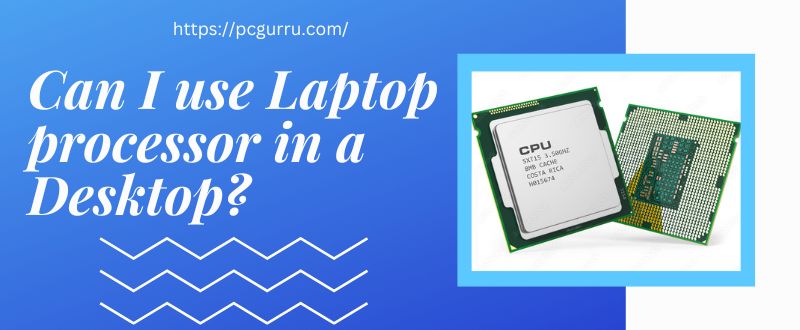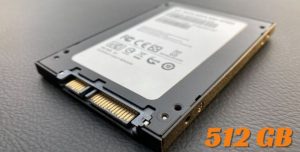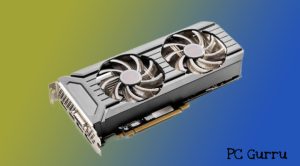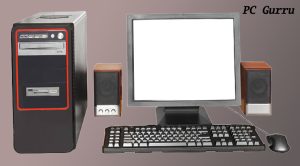Can I use Laptop processor in a Desktop? What exactly is the difference between laptop processors and desktop processors? Which one should you buy? It depends on what you’re using it for, of course, but there are some general differences that can help guide your decision. Here’s what you need to know about laptop processors vs. desktop processors, their advantages and disadvantages, and how to pick out the right one for your needs. We will address the question, “Can I use a laptop processor in a desktop?” in this article.
Laptop processors
To understand what laptop processors are, it helps to understand what a processor is in general. A processor is basically a computer’s brain. It handles computing tasks like calculations and storing information in short-term memory. Laptops have more limited space for processors than desktops do because of their smaller size—most laptops have just one central processing unit (CPU), whereas desktops can house multiple CPUs at once—but laptop manufacturers have made strides to make up for that limitation by designing their chips with low energy consumption in mind.
This means that laptop processors run cooler than desktop CPUs; they also usually use less electricity (though heat is often considered an acceptable tradeoff). In exchange for those benefits, they offer slower speeds than their desktop counterparts. Most modern laptops use Intel Core i3, i5 or i7 processors. The ’i’ stands for Intel, while Core indicates that it’s part of Intel’s Core line of products. For example, an Intel Core i3 chip is better than a non-Core chip from another manufacturer. Most mobile chips run on dual cores, which simply mean they’re able to handle two computing processes simultaneously.
Desktop processors
Why do you need them? Desktop processors are still relevant in today’s world. And while they might be significantly less popular than their laptop counterparts, they can come in handy when you don’t have access to a plug. Desktop processors are also cheaper than their portable cousins; if price is an issue for you, buying a desktop processor will likely be less expensive than purchasing multiple portable processors. So why buy a desktop processor over a laptop one? The answer is simple: performance.
Desktop processors outperform laptops by leaps and bounds. This means that if you’re looking for speed, then a desktop processor is right up your alley! However, there are some disadvantages to desktop processors as well—the main one being size. If portability is important to you, then it makes sense to purchase a laptop instead of investing in a desktop model with poor battery life and limited screen space.
Can I use Laptop processor in a Desktop?
Answer to the question, “Can I use a laptop CPU with a desktop?” is simple and that is no. There are many reasons. This is due to the fact that laptops use a different socket than what can physically be inserted onto a desktop motherboard. Although both laptop and desktop CPUs perform the same basic functions it is impossible to use a CPU from a laptop on a desktop. The two types of CPU are completely different in every way, including socket design, pin arrangement and TDP. Desktops are not portable and require more power, while laptops are made to be portable and easy to use. These are also some other reasons why laptop processors are different from desktop processors.
Laptop CPU is Joined with Motherboard
The CPU is soldered directly on top of the motherboard it cannot be removed without special tools and professional skills. There are many reasons manufacturers solder laptop CPUs. First, they are more affordable and easier to make. Second, because laptops are portable, they must be securely attached to the socket. The socket arrangement of Pin Grid Array or Land Grid Array (LGA), as seen on desktops, can cause the CPU to slip from its socket, especially during bumps. The final is a soldered CPU. A soldered CPU saves space. It is important to note that almost all laptops today have their CPU soldered directly to the motherboard. These are difficult to remove, and even if they were to be removed there is no telling what damage it would do to the motherboard or CPU.
Difference in size
Now let’s talk about one of the most important difference between laptop processors and desktop processors: size. The heat generated by both types of processor is what determines how big they need to be. A desktop processor needs more room for cooling because it generates significantly more heat than a laptop does. That means that all those processors designed specifically for use in desktops are generally larger and heavier than those designed for use in laptops. This difference has some pretty obvious advantages and disadvantages.
Power Consumption
Even answer to the question “Can I use laptop CPU in a desktop?” was affirmative; there is the issue of laptop CPU being generally underpowered compared to desktop CPUs. Laptops are designed to save power and minimize heat generation. Laptops are made to consume minimal power, so they offer lower performance than their desktop counterparts. For example, take the 11th gen Intel Core i7 CPU which is the best for desktops and laptops. Because they are more ventilated, desktop-based CPUs can have higher ratings (wattage). They also offer better performance. They are also resistant to high temperatures causing throttling problems. High performance desktop CPUs are possible. A laptop CPU should not be used as a desktop CPU.
Variance in shapes
Another problem with laptop CPU is their tendency to be rectangular. However, the CPU sockets on desktop motherboards are all square-shaped. Sockets can also be used to identify the CPU. The shapes of a laptop’s CPU cannot match those on a desktop motherboard.
Variance in Pins
There is difference in number of pins as well. The BGA1449 socket is used by an 11th Generation Intel Core i7 1165G7 laptop-based processor. It has 1449 pins. The 11th Generation Core series CPUs have the LGA1200 socket and 1200 pins.
Performance
A desktop processor is likely to be cheaper than multiple portable processors. Why choose a desktop processor instead of a laptop? Performance is the answer. Laptops are outperformed by desktop processors by leaps, bounds. A desktop processor will give you speed!
Removable processors in laptops
Some laptops still have removable processors despite all the changes. These processors are not soldered to the motherboard. These laptops can be very rare and expensive.Removable processors are available on laptops like the Acer Nitro 5, Dell XPS 15 9500 and Lenovo ThinkPad t490. However, this does not mean that laptop processors cannot be incorporated into desktop motherboards. These laptops can be fitted with removable CPUs, but you’ll need the same socket on your desktop in order to plug them into. However, there are exceptions. For example, take the third-generation Intel Core i5-3210M processor. This CPU is an exceptional example of how a Laptop CPU can be used on a desktop. The PGA988 socket is available on the Intel Core i5-3210M CPU.
It will be obvious that it doesn’t use the BGA socket and therefore won’t need to be soldered to the motherboard. This CPU can therefore be removed. Fortunately, you also have the option to find a desktop motherboard with the same PGA988 socket. This allows you to plug in this CPU. The point is again that the arrangement must match the motherboard socket and CPU. You can have a removable CPU in a laptop but the socket on your motherboard is not compatible. The arrangement will not work.
Conclusion
Most cases answer “can I use my laptop CPU in my desktop” no. Why? Because majority of laptops have a soldered CPU. However, there are exceptions to this rule, especially if your laptop is very old. Even if your laptop has a removable CPU, you will need a compatible desktop motherboard. A soldered CPU laptop is possible on a laptop that is relatively recent. This would make it difficult to remove the laptop from the motherboard. Another problem is that the shapes of a laptop’s CPU cannot match those of a desktop motherboard. Laptop’s CPU is often rectangular. The CPU sockets of desktop motherboards, however, are square-shaped. There is difference in number of pins in sockets as well for laptop and desktop processors.
When it comes to your computer or laptop, you have a decision to make. Which one is better for you – a desktop processor or a laptop processor? It depends on what you want out of your device. Both devices can run apps, process documents and allow for internet access. However, one is not necessarily better than another; it all boils down to personal preference. If you don’t like large bulky computers around the house but still need access to your files while at work or on vacation, then a laptop may be best for you. If you are more comfortable with having something large enough that sits on your desk and connects directly to everything in your home office, then definitely go with a desktop instead of its portable counterpart.








